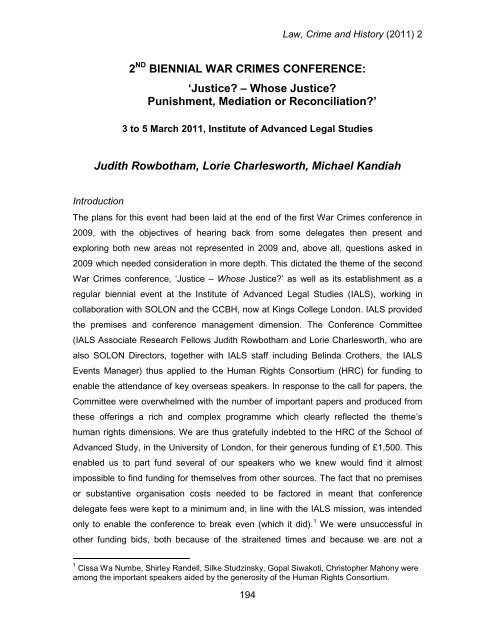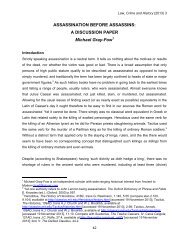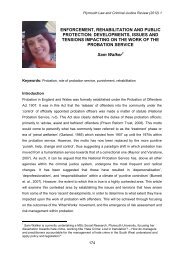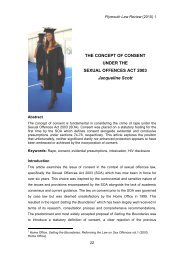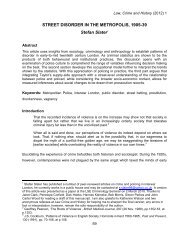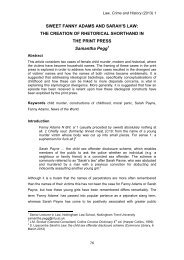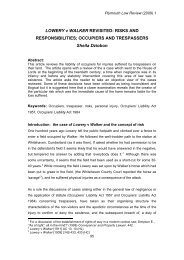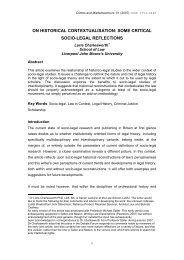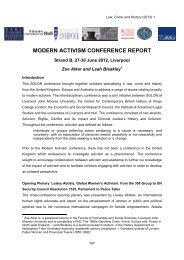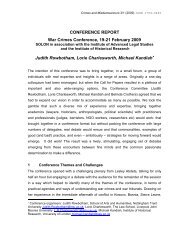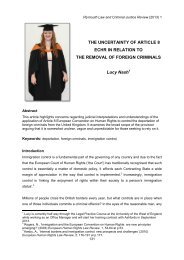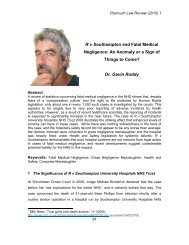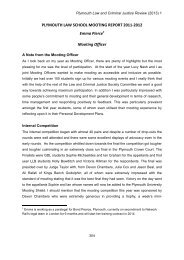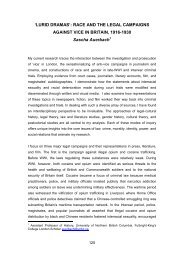Judith Rowbotham, Lorie Charlesworth, Michael Kandiah
Judith Rowbotham, Lorie Charlesworth, Michael Kandiah
Judith Rowbotham, Lorie Charlesworth, Michael Kandiah
You also want an ePaper? Increase the reach of your titles
YUMPU automatically turns print PDFs into web optimized ePapers that Google loves.
Law, Crime and History (2011) 22 ND BIENNIAL WAR CRIMES CONFERENCE:‘Justice? – Whose Justice?Punishment, Mediation or Reconciliation?’3 to 5 March 2011, Institute of Advanced Legal Studies<strong>Judith</strong> <strong>Rowbotham</strong>, <strong>Lorie</strong> <strong>Charlesworth</strong>, <strong>Michael</strong> <strong>Kandiah</strong>IntroductionThe plans for this event had been laid at the end of the first War Crimes conference in2009, with the objectives of hearing back from some delegates then present andexploring both new areas not represented in 2009 and, above all, questions asked in2009 which needed consideration in more depth. This dictated the theme of the secondWar Crimes conference, ‘Justice – Whose Justice?’ as well as its establishment as aregular biennial event at the Institute of Advanced Legal Studies (IALS), working incollaboration with SOLON and the CCBH, now at Kings College London. IALS providedthe premises and conference management dimension. The Conference Committee(IALS Associate Research Fellows <strong>Judith</strong> <strong>Rowbotham</strong> and <strong>Lorie</strong> <strong>Charlesworth</strong>, who arealso SOLON Directors, together with IALS staff including Belinda Crothers, the IALSEvents Manager) thus applied to the Human Rights Consortium (HRC) for funding toenable the attendance of key overseas speakers. In response to the call for papers, theCommittee were overwhelmed with the number of important papers and produced fromthese offerings a rich and complex programme which clearly reflected the theme’shuman rights dimensions. We are thus gratefully indebted to the HRC of the School ofAdvanced Study, in the University of London, for their generous funding of £1,500. Thisenabled us to part fund several of our speakers who we knew would find it almostimpossible to find funding for themselves from other sources. The fact that no premisesor substantive organisation costs needed to be factored in meant that conferencedelegate fees were kept to a minimum and, in line with the IALS mission, was intendedonly to enable the conference to break even (which it did). 1 We were unsuccessful inother funding bids, both because of the straitened times and because we are not a1 Cissa Wa Numbe, Shirley Randell, Silke Studzinsky, Gopal Siwakoti, Christopher Mahony wereamong the important speakers aided by the generosity of the Human Rights Consortium.194
Law, Crime and History (2011) 2‘standard’ conference, but an interdisciplinary one. Thus we were unable to offer morefinancial support, which enhances our gratitude to the HRC still further. We also thankthose universities and institutions which did provide support to our speakers and ourdelegates, to enable such a distinguished and useful mix to be at the conference. Ourother collaborators, acting as endorsers of the conference, included (also from theSchool of Advanced Studies) the Institute of Commonwealth Studies, Institute for theStudy of the Americas plus the Raoul Wallenberg Institute of Human Rights andHumanitarian Law, Sweden.The Conference Context and ContentAgain, as the responses to the Call for Papers came in, we were delighted to see thatwe had a diverse mix of experience and expertise with academics and practitioners,covering the anticipated fields of law, history, politics and anthropology but also includingjournalism and heritage this time. We had a number of ‘repeat’ speakers, reporting ondevelopments in their areas in the last two years, but we also had new contributions.Again, we decided to keep the numbers of non-speaker delegates down, to promote thatsame level of genuine debate that had characterised the event in 2009, in the hopes thatwe would again elicit ongoing practical and theoretically-based exchanges of ideas,experience and practice. However, this was even more difficult than it had been whenpreparing for the 2009 conference, because we had around 140 high quality proposalsand we would like to take this opportunity of thanking those who submitted proposals yetwho were not selected by us. The committee agonised over the choices and rejectionswere never on the basis of lack of quality but rather lack of space and funding within thelimits of the conference. However, a particular delight this time was to welcome speakersand also delegates from so many overseas locations. From Nigeria, from Singapore,from Japan as well as the USA and Europe, they came. We also were pleased that notonly students and academics came but also practitioners – indeed we were humbledthat the majority of the overseas delegates were practitioners looking to take homeinsights from this event. We welcomed them all, as well as our speakers, in theknowledge that their range of experience and perspectives could only enrich theconference and that if they hoped to learn from us, we knew we would learn from them.A conference with such a challenging subject might be expected to be a sombre affair,but as in 2009 the conference was lively, stimulating and uplifting, because of the195
Law, Crime and History (2011) 2admirably passionate commitment demonstrated by all, fuelling a set of challenging andpositive debates. The delegate on the Ashgate stand commented on the ‘buzz’ of theconference, saying it was the most stimulating she had ever attended. No easy answersor solutions were proffered, but a will to advance understanding, to take on board theviews of others and to make changes that would make a difference were all tabledduring these three, hectic and intense days.The conference opened with a rather different plenary session to that originallyenvisaged, as Jose Pablo Baraybar (EPAF, Peru) was unable to attend due tocircumstances entirely beyond his control! However, we include in this issue of theJournal a reflection on the work done by JP and EPAF, resulting in the well-deservedaward of the <strong>Judith</strong> Lee Stronach Human Rights Award for 2011 so that we can takenote of the continuing and much needed efforts by this inspiring man and his equallyinspiring and dedicated group. 2 We also learned that another plenary speaker, LesleyAbdela, was laid low on a bed of illness, and so also unable to attend, to ourconsiderable regret.Different Perspectives: Different UnderstandingsAs a result of the necessary changes to the plenary structure of the conference, DrGopal Siwakoti consented to show the drama documentary that his NGO, Inhured, hadcreated for a Nepalese audience, since it was also available in an English language subtitledformat with some English voice-over commentary. ‘Journey to Justice’ explored theneed for a full and transparent transitional justice scheme in Nepal to ensure themaintenance of human rights there, using a dramatised reflection on the war crimes thathad characterised Nepal’s civil war. The documentary aimed to ‘inform, educate, inspireand encourage everyone to seek the truth, prosecute the perpetrators, undertakecomprehensive reparation and advance institutional reform for securing justice tovictims, lasting peace and reconciliation in a post-conflict and divided society like Nepal’.Gopal Siwakoti and his colleagues insist that ‘Informed participation… is vital’ to anypost-conflict reconciliation initiatives, as it is the only way to safeguard human rights. Fornon-Nepalese Western orientated viewers, the challenge lay as much in the choice offormat, because this was no quietly restrained production, but one which insisted on2 See the contribution ‘Are We Perfectible?’, Rebeca Blackwell.196
Law, Crime and History (2011) 2displaying a representation of the violence that had taken place in order to make its point.Nor did it use ‘great actors’ to do a very difficult task, but it was honest and straightforwardin making its points. In many ways, such a film could be more informative, and moreinstructive, of attitudes outside the West towards human rights issue than a more smoothlymadeprofessional Western effort could have been It was agreed in debates during theconference that a circulation of such indigenous productions would certainly promote abetter engagement with the local cultural understandings and perspectives on conflict andcould so provide an invaluable aid for those from the West going to, say, Nepal as in thiscase, to work for NGOs or as part of various diplomatic, legal and military missions to aparticular region. Thus it was a good start to a conference which sought to question thenature and formats of justice and its delivery in an international context.The Round Table on ‘Practical Issues in Assessing Justice’ which followed illuminatedthis aspect particularly strongly, but also brought up (as in 2009) the importance of aconsciousness of the language of rights and of justice – and the need to achieve anunderstanding of the different concepts which were being expressed through apparentlysimilar phraseologies by the different parties involved in identifying war crimes andseeking justice for the victims thereof in ways that reinforced, rather than diminished, therule of law. Chaired by MP Rory Stewart, and led by Yolanda Foster (Amnesty) andMark Hull (a military historian from the US Army Command and Staff College), thewealth of practical experience and insight displayed by these three stimulated a hardtalkingdebate. Rory Stewart used his impressive knowledge of both Iraq andAfghanistan in particular to shape the debate, amply aided by the complementaryexperience of Yolanda Forster and the perspective of Mark Hull, with his responsibilityfor training US personnel on their way to these regions. Stewart’s point about the needfor any Western nation to have a properly informed and so, a properly confidentdiplomatic and military when engaging in the international arena was a themehighlighted by commentary from non-Western speakers throughout the conference. Theonly regret was that his political duties meant this was the only session he could attend,and this prevented him from being a most useful delegate throughout the conference –in saying we need more politicians like this, we make a comment that is regardless ofparty or nation. He made a brief but memorable contribution, and we shall hope tointerest him further in subsequent events. In assessing the key question for theconference, we do need figures who recognise the extent (in Stewart’s case, very197
Law, Crime and History (2011) 2considerable), but also the limits, of their expertise and consequently, the need to listenmore – and have the ability to take informed advice to try to discover who are the bestpeople to listen to in any situation. Yolanda Foster’s comments underlined theimportance, in this context, of the work of Amnesty and its passionate commitment to aneven-handed investigation of local situationsAt the same time as the Round Table, another very important session was taking placefocusing on Bangladesh and the War Crimes Tribunal there. The perspectives on thisprocess were provided by Md Shahinur Islam, the Registrar of the Bangladesh ICT, andby a returning speaker, Toby Cadman 3 with Steven Kay QC and John Cammegh, allacting for Jamaat-e-Islami as a defendant before the tribunal. The issue here was the‘fairness’ of the tribunal – a constant theme for the conference. A particular problematicfor the Bangladesh process is the time elapsed since the events being focused on, sincethey occurred during the Liberation War of 1971, again addressing through this casestudy example the issue of time as a factor in such prosecutions. With the process in itsearly stages still, we look to hearing more on the progress of the Tribunal in the contextof these debates at the proposed 3 rd Biennial War Crimes Conference, to be held atIALS in 2013.Revisiting the ThemesTwo themes which had been important in 2009 were present more implicitly than we hadoriginally expected. The war crimes trials in Bosnia Herzogovina which had been sosubstantial a feature in 2009 were revisited, but their contribution was more as a startingpoint for other reflections: we think it will be vital to revisit the area in 2013, after theconclusion of the mandate in 2012. Equally, Guantanamo Bay did not feature as a topicfor major discussion in its own right, partly because Candace H Gorman had to withdrawat the last minute due to the need to remain in the US to help her remainingGuantanamo client, Ali Hamza al Bahlul in his appeal – and it is worth looking atCandace’s blogspot contributions, and through that at the judgment and the reactions toit: gtmoblog.blogspot.com. All being well, we shall hope to return to somethingwhich is a serious issue for the health of international justice in 2013, when wewill hope that Candace can attend.3 Toby Cadman was a speaker in 2009 on the Bosnian War Crimes trials, in his previous capacityas advisor there.198
Law, Crime and History (2011) 2However, Cambodia was a major theme raised first in 2009 and one to which wereturned in 2011 in much more substantial detail. As well as Silke Studzinsky, who hadspoken in 2009, a number of other speakers explored progress over the last two years inthis particular trial process. The different perspectives on the relative ‘success’ of theCambodian initiative was instructive of the dilemmas posed by the justice process inbringing war criminals to trial, especially – as noted above with Bangladesh – where asignificant lapse of time before the initiation of any justice process hinders the properprocesses of law. There was also the issue of identifying the appropriate targets forprosecution and the scope that prosecutions should include, as Warren Binford, in herdiscussion of the Khmer Rouge’s use/corruption of children underlines. She arguedpowerfully that, for instance, existing law would have provided a solid foundation for theprosecution of ‘Duch’ to have focused more firmly on this dimension to his crimes – andyet, there was a lack of will on all sides to deal with the issue of children in war,something that had a resonance for other areas such as Uganda, of course as the paperby Daniel Ruhweeza underlined. Most sadly informative in this context was SilkeStudzinsky’s relative pessimism about the prospects of the delivery of justice by theECCC, even while she insisted on the importance of making the attempt. It wasinstructive to be reminded just how difficult the delivery of a worthwhile outcome is,despite the high hopes with which an initiative like the Cambodian tribunal can start out.There is clearlyHuman Rights and War Crimes: Theories and PracticesThe human rights dimensions to the formats for the delivery of justice was anotherconstant issue debated – with consideration being particularly given to the concept ofjustice – how ‘international’ is justice, was a key question, regularly directly or implicitlyvoiced. Promoting a theme which was first aired at the 2009 conference, a regularquestion asked was whether the ICC could have a real role which is recognised andaccepted by post-conflict populations? Jeanne Woods, for instance, questioned the longtermpositive impacts of the effectiveness of the ICC and the impression given by currentprosecutions that there are certain states and individuals who are, for reasonsperceived to lie within an unjustly differential made between Western and African states,considered to have impunity from prosecutions. Craig Ruttan focused on case studiesfrom Sudan and Uganda to critique the actual contributions of the ICC to furthering199
Law, Crime and History (2011) 2justice in Africa. He fully accepted the Court’s commitment to the ‘five pillars of peacebuilding’;security, economic development, political arrangements, justice, andreconciliation, and acknowledged that while challenging they were well-establishedstandards for the delivery of justice both nationally and internationally. However, heargued that the experiences of his two case studies revealed the inflexibility of the courtas currently constituted and its consequent inability to take account of importantdevelopments arising from local realities. For him, the International Criminal Court wastoo rigid an institution to address war crimes given the reality that there was generallynot a broad and apolitical acceptance of its rubrics. He wanted its success; he fearedthat unless it changed this could not happen.The points made by speakers present was further emphasised by a paper, read inabsentia, from Daniel Ehighalua. 4 He highlighted an issue which came up regularly, bothin papers and in discussions, that there appeared to be a Western conceptualisation ofwhat constituted justice which was inflexible and so there was a constant potential forcollisions between how many African states and individuals conceptualised peace andjustice. While it was generally agreed that peace could never be traded for justice, therewas less clarity on precisely what constituted justice. Ehighalua, in common with others,commented on an African perception that the ICC was at a crossroads. Would it provepossible, in the process of dealing with likely upcoming interventions by the court, to reengagewith a debate about topics such as impunity in ways that can restore confidenceamongst African states in the work of the court? These issues remain at the core of thefuture and success of the ICC, and not just in African perceptions.There are, as delegates commented, real difficulties not only in defining what constitutesa war crime in theory but also relating that theory to the realities of war crimes, takinginto account how different groups understands events within the cultural spaces4 To the embarrassment of the conference organisers, the UK government’s Borders Agencyrefused Dr Ehighalua’s visa on the grounds that they felt he was unlikely to return to Nigeria: Wecan only apologise to him for such a clearly flawed decision, especially given his ability to accessvisas to the USA and other parts of the world in very recent time! It robbed the conference of animportant contribution, because although a version of the paper could be read, the expertise andjudgments Daniel would have provided in debate was missing. It is anticipated that his paper willbe a chapter in the forthcoming volume, however, enabling his comments to have a propercirculation. We should note that the Agency’s decision was discussed at the conference, and thenegative implications for good scholarship and for the UK’s reputation more widely was madevery forcefully to the various Foreign Office officials who were present.200
Law, Crime and History (2011) 2constituted by the local/national and the international. After all, punishment in one senseactually legitimises a crime by providing it with a substantive legal identity – but howdoes (should) that identity relate to traditional indigenous comprehensions of a crimeand a more universal or international comprehension, and does it matter?Media and War CrimesThe way in which justice is understood by different audiences was highlightedparticularly through the Round Table session run by Wanda E. Hall (Interactive Radio forJustice) and Milica Pesic (Media Diversity Institute) which became a plenary, replacingLesley Abdela’s planned talk. It proved to be a most thought-provoking and stimulatingsession, revealing the different agendas, experiences and pressures placed onjournalism in an era when journalism is expected by many to act as the repository andguardian of ‘truth’. In this context, the questions raised by an examination of the roleplayed by journalists in shaping popular understanding of war crimes and theirperpetrators were vividly illuminated by Milica Pesic’s comments on her ownexperiences as a Serbian journalist, pointed up by video clips from that conflict. Shereflected with great honesty and courage on her role as a journalist in that conflict, inorder to pose the question that few of us would previously have posed: can journalistswho are not political spokespeople for a regime, and simply in the ordinary course oftheir duties as employees of a media company of some kind, conduct themselves asjournalists in ways that amount to war crimes? Does misrepresentation, misinformationand unreliable propaganda, such as seriously distorts the realities of a conflict situation,amount to a war crime if it helps to sustain and justify a conflict? There was no easyanswer here, but in raising the role of propaganda and journalism as propaganda in war,some uncomfortable questions for those in that profession were raised. Reportage of therecent events in Libya from supporters of the Qaddafi regime and also from Syria as wewrite this report, as well as media depictions of what is going on more widely in theMiddle East and North Africa, in Burma and Pakistan – and in Northern Ireland –underlines the need to consider the importance of good and ‘bad’ media practice in bothconflict and post-conflict situations, as an important underpinning to any successfulmanagement of the rebuilding of societies.As a way of promoting understanding and involvement in the process of reconstructionpost-conflict civil societies, the promotion of the ordinary voice in and through the media201
Law, Crime and History (2011) 2was shown to have been a key strategy used by Interactive Radio for Justice in thepresentation from Wanda Hall. This project closed in July 2011, some five months afterthe conference, but its web page is still active, at http://www.irfj.org/, and we wouldstrongly urge people to look to it as a model for further efforts in other regions. Perhaps,as reconstruction efforts begin in Libya, it provides a pattern for achieving what theinterim government insists it is striving to achieve in the shape of a Libyan democracywhich is genuinely inclusive. Focusing on regions where the ICC is investigating seriouswar crimes, such as Ituri, DRC, ordinary citizens were encouraged by the project to usethe resources of a radio network to ask questions of their leaders, regional and national,that were important to them. These were not necessarily the great questions of state thatwere voiced in public statements, but they reflected the everyday concerns of the manand woman on the street, in the market and in the home. As the website shows, peoplewanted to know from their leaders more about the restoration and continuing progress ofinitiatives to promote ordinary justice as well as the progress of justice for victims of warcrimes. The project offered an opportunity for a dialogue between government figuresand the ordinary citizen which would have been difficult to organise in any other way.Given the importance that emerged during this conference of considering the role,impact and responsibilities of the media, it was a particular shame that Kris Wetherholt,the Co-founder and Chairman of the The Humanitarian Media Foundation (HMF) / HMFand the Editor of the Journal of International Media and Information Policy could not bewith s due to a last minute family emergency, but we do hope to see her in 2013!‘Victims’ and SurvivorsAn associated dilemma highlighted in the opening video also continued to inflect thepresentations and considerations – the question of personal responsibility for warcrimes, and consequently, the issue of who were the ‘real’ victims. Child soldiers, forinstance, forcibly recruited and corrupted but growing up to continue to commit crimes.We were fortunate enough to have not only two important papers from Warren Binfordand Daniel Ruhweeza but also Judge Kyrie James to aid our debates in this area. 5Where should the emphasis lie? On these children as perpetrators or as victims? Onecertain conclusion from the debates was the importance of discovering strategies which5 There was a subsequent conference on Child Soldiers organised by Kyrie James in May 2011,which we hope will produce some important results.202
Law, Crime and History (2011) 2would help such children to become survivors, not permanent victims – a trope that wasalso important for other victims of war crimes, particularly women who were victims ofrape as a weapon of war.Indeed, as anticipated, there was in the conference considerable stress on theimportance of remembering the gender dimension, and in particular its impact on womenas victims in conflict and the obstacles in the way of such women emerging as survivorsinstead. This perspective was included in a number of important papers. Daniela Nadjprovided an analysis of sexual violence jurisprudence, which looked at its interpretationby international criminal jurisprudence, and asked telling questions about how currentpractices, such as those pursued by the International Criminal Tribunal for the FormerYugoslavia in dealing with rape and sexual violence against women, were positivelyeffective for those concerned. It is important, as she stressed, not to be too confident inthe ability of international law, working in local contexts and complicated by the impact oflocal cultural realities, to provide justice. The stress on ethnicity, for instance, as in thecase of the former Yugoslavia, could be said to have hindered, not helped, the campaignfor gender equality because of the consequent perpetuation of hierarchical anddichotomised gendered subjectivities; subjectivities that have, in reality, done little todispel deeply entrenched stereotypes of women in international law. If they are presentin the law, how can they be combated by women seeking to become survivors and notvictims of sexual violence, was the question that was raised by this importantcontribution. Theresa de Langis was equally challenging in her reflections on the realitiesof post-conflict Afghanistan, in what was for one author of this report a saddeningreminder of the conclusion by Lesley Abdela that she was less hopeful about the impactof her work there than in any other post-conflict area where she had worked. Thedanger identified by de Langis, on the basis of compelling evidence, was that anyinternational efforts to guarantee women’s rights in Afghanistan would be sacrificed onthe altar of expediency – viz, a desire by Western powers to emerge with a ‘peace’ dealinvolving the Taliban. Niaz Shah in a challenging paper on Taliban attitudes to war hadalready pointed out that in his judgment (one shared by Onder Bakircioglu of QueensUniversity Belfast in his assessments of the concept of just war in Islam), the Talibancode was at odds with both Islam and the international law of armed conflict. Was there,in that likelihood, any real prospects of peace going hand in hand with justice for Afghanwomen?203
Law, Crime and History (2011) 2Gendering ReconstructionThe importance of promoting women’s access to post-conflict reconstruction as a keyelement in women’s access to justice was also a theme in Shirley Randell’s plenary,which provided a controversial and provocative survey of the realities of events in postconflictRwanda. She started by highlighting the use of rape as a weapon of war and itsconsequences, but pointed out that the combined realities of a genocide policy that hadparticularly targeted men with post-conflict prosecutions of so many surviving maleperpetrators had created an almost unprecedented set of practical opportunities forwomen to participate fully and appropriately in the rebuilding of civil society. Pointing to a56% representation of women in parliament, she argued that there had been a genuinere-conceptualisation of gender roles in the country. By highlighting women’s historicalroles as behind-the-scenes advisors, women had been able effectively to argue forgender equality in the present. This had been a strategy which had enableddevelopment of laws to protect women, but also enabled the participation of womenworking in civil society organizations at local levels in projects to rebuild and unifycommunities. In practice, this has aided development of entrepreneurial projects, wherewomen affected by the genocide, survivors and wives, mothers, daughters and sisters ofvictims have come together with wives of perpetrators, drawing on the local umugandatradition of community work. The importance of the context provided by internationallaws as a guarantee of such projects has been aided also by legal clinic approachwhereby, amongst other things, the robustness of some detailed laws related to cases ofrape are in progress to assist this process. Shirley thus argued that for all its ongoingproblems, one thing Rwanda did represent was an effective gender-mainstreamingapproach. Unlike some other post conflict societies (such as those that would have beenhighlighted by Lesley Abdela, notably including Iraq), Rwandan women were able todemonstrate they possessed not only political will but also economic success. Sheargued that she did not want to portray Rwanda as utopian, but she did think – for all thecriticisms voiced of President Kagami as well as the continuation of patriarchalideologies in many areas – that it was important to acknowledge the degrees of successthat had been achieved. She argued, amongst other things, that it had been animportant aspect of post conflict reconstruction that there was now a willingness tooverlook much of the past patterns and histories of atrocity, because women, as keyvictims on both sides, were actively in agreement. They were not forgotten victims, but204
Law, Crime and History (2011) 2survivors and agents of their own choices in this area at least. This provided aninteresting echo of Cissa Wa Numbe’s closing plenary.Justice, Truth and ReconciliationThe consideration of media links with a point made by several other speakers that beliefin the fairness of the processes involved in post-conflict reconstruction is essential to abroad acceptance of the outcomes. Considerations of the media presentation of conflictevents also raises another uncomfortable consideration – how far is ‘justice’ allied to‘truth’, or what might be considered an honest balance of culpability and complicity? Theresponses of several practitioner delegates suggest that there is no easy answer to this.Several insisted on the importance of incorporating the international understanding, butothers insisted that the challenge to traditional systems was counterproductive.Complementing this, Patryck Labuda reflected on what he identified as the in-built failuremechanisms in the Democratic Congo Republic’s Truth and Reconciliation Commissionset up in 2003 in a thorough discussion of a Commission that has normally received littlepublicity, because of its failure. Did it provide a model warning lesson for other initiatives,or was it the exception that tested the rule? In another session, Heather Devere, of theNew Zealand National Centre for Peace and Conflict Studies, considered the problemsand opportunities of transitional justice, especially given the need to make it bothcredible and acceptable to local communities by developing formats which recognisetraditional local expectations of ‘justice’ while enabling a scenario which permits warcrimes to be tried effectively. She reflected on examples of work in locations as diverseas the Solomon Islands, in Papua New Guinea and Sierre Leone. Stressing the need forpromotion of culturally sensitive contexualisations of transitional justice, she wasrelatively positive about the prospects. By contrast, some other presenters were lesscertain about the impacts of transitional justice and of strategies such as Truth andReconciliation Commissions. What can you do for people who have a different ontologyfor the dispensation of justice, particularly when the general interpretations of thedifferences between international and indigenous justice delivery posits the former asencapsulating retribution (possibly life-long) and the latter as relying on forgiveness andreparation as mechanisms for reintegration into communities? In a wryly amusingreflection based on his own experiences, Lyal Sunga asked whether Truth andReconciliation Commissions did work to serve the ends of justice, or did they instead, asLabuda had argued, hinder, obstruct or subvert it? Could they be effective alternatives to205
Law, Crime and History (2011) 2criminal prosecutions, allowing a better way of post-conflict society rebuilding? A keyproblem was the issue of either impunity or the issuing of amnesty, and how these couldfit into the equation. Highlighting the inherently unstable and contested nature of ‘truth’,he suggested ten principles as the way forward. Their adoption, he hoped, could work tooptimise the potential for such commissions to provide a real alternative to prosecutions,genuinely contributing to justice, peace and human rights. Further details of thesecannot be included here without damaging the presentation of them and theirjustification, for reasons of length, but they will feature in the future War Crimes volume.Reflections put forward by Rod Rastan (ICC) and the LSE’s Tim Allen (kindly standing inat short notice for Adrawa Lawrence Dulu, who had had to remain to deal with a humanrights crisis in southern Ethiopia) also crucially focused on an accompanying trope, thatof truth (or reality) and justice, in the manner of delivering justice and the dilemmasinvolved in seeking to respect and promote local sensitivities. Once again, the role of theICC was a key issue. In a measured contribution, Rastan pointed out that the task of theICC was an almost impossible one – because not just had the official systems of law andorder broken down in regions where the ICC was active, but also the mundane dailyrealities of orderly daily behaviour within communities. If international intervention had tobe unusual, effectively a last resort, the fact that this often represented an internal crisisensured that the weight of local and international expectations could be extremelyproblematic for judges. Expanding on this, Allen’s passionately felt survey of theprinciples he identified as underlying the work of the ICC identified many flaws in theinternational mechanisms for the delivery of justice but insisted that despite the ‘relative’nature of justice so promoted, it was sounder and less susceptible to politicisation than areliance on the so-called ‘traditional’ rituals of justice, because of the practical informalityand lack of uniformity that habitually characterised such rituals before the disturbancesof conflict. He insisted that the tendency to ‘invention’ of a universality for such ritualswas a dangerous threat to effective post-conflict justice management and the potentialfor successful reintegration of offenders into society. For Allen, as for many delegates,the flaws of the ICC were not so severe a problem to the delivery of justice as a relianceon the alternatives would be.206
Law, Crime and History (2011) 2The Importance of Historicising Considerations of War CrimesTim Allen’s interdisciplinary contribution was one of those which also remindedparticipants of the importance of seeing the issue of war crimes in historical perspective,and not just as a recent issue. However, it also reminded us of the importance ofcomprehending law and its basic tenets, including the significance of understandingthrough law what constitutes a war crime and differentiates it from ordinary criminality. Ifthe terminology of war crimes is recent, the law and the issues involved are not. BothDavid Fraser and <strong>Lorie</strong> <strong>Charlesworth</strong> made this point very forcefully in theirpresentations. Fraser’s plenary, contextualising and taking further his recent book,discussed the importance of retaining a historical dimension, because – apart fromanything else – chronological time was too readily susceptible to the diminishing of theissues. His powerful justification of the war crimes trials in Australia in the 1980s and1990s emphasised that without a historical contextualisation of such events (ones which,relatively speaking, could be dismissed as minor), the action of the Australian state inlaunching the prosecutions of Ivan Polyukhovich, Heinrich Wagner and MikhailBerzowsky could have seemed vengeful and disproportionate as well as being irrelevantto contemporary Australian reality. The invocation of both a historical methodology tocontextualise the operation of the law and a historical chronology serves to remind usthat there are certain types of criminality which transcend such national boundaries, andjustifies the use of the law to launch prosecutions – especially if that is supported byevidence and by the desire of victims. Dan Plesch’s paper examining the lessonsprovided by the United Nations War Crimes Commission of 1943-48 for current practiceby international tribunals was a further reinforcement of that point; with his emphasis onthe reality that the UNWCC, drawing on the past to comprehend what was going on inthe closing days of the Second World War, drew up robust theories and principles whichhave been used since in developing the protocols and practices used for war crimesprosecutions. 6 Linking to this, both <strong>Lorie</strong> <strong>Charlesworth</strong> and Daniel Marc Segesserstressed the importance of recognising the individual contributions made by lawyers,prepared to dedicate themselves to providing a legally sound and robust framework inwhich international tribunals could work. This was further enhanced by Simona Tobia’spaper that highlighted the reality that international tribunals, working in languages notnecessarily accessible to all participants, relied heavily on translators for the provision6 Dan Plesch sent a copy of the PDF from the UN archives of the United Nations War CrimesCommission 1943-1944 to delegates, and <strong>Judith</strong> <strong>Rowbotham</strong> is happy to pass on to anyone.207
Law, Crime and History (2011) 2and verification of evidence, and to enable the full participation of all, defendants,witnesses and prosecutors, in the trial process.Case Studies from HistoryHistory, in other words, reminds us constantly of the need and legitimacy of using thelaw to deal with war crimes, and of the significant roles taken by outraged legal experts.Does it need a sense of outrage for war crimes prosecutions to be effective? But what,then, are the dangers of outrage inflecting or distorting the evidence or the legal processinappropriately? The evidence of this strand in the conference was broadly reassuring, inthat it demonstrated that there is a historical tradition of such outrage being tempered bya determination to observe the rules of law in order to avoid being identified with theperpetrators. But there are dangers also that, over time, there can be an ahistoricalreinterpretation of past events and the legal reactions to them. Sascha Bachmannprovided a highly provocative revisiting of the legacy of Nuremberg in the light of thecurrent international management of the war on terror and the responses of the USA inparticular. The importance of detailed and legally-sophisticated historical studies of keycases, and the dangers or reinterpreting the past using present politically-inflectedjudgments, was further underlined by the contributions from Bill Bowring and SzymonJanczarek, discussing the work of the European Court of Human Rights in relation toKononov v Latvia (17 May 2010). This discussion did, in some ways, provide anuncomfortable challenge relating to the need for consistency in the development of theprinciples of international law. Crucial to their complementary reflections, drawing ondifferent experiences (academic and practitioner), were questions about the principles oflegality and how these related to the prosecution of war crimes. For them, and as BillBowring trenchantly pointed out for Russia, the application of international criminal lawby human rights courts was problematic given that the proceedings could also crediblybe interpreted as an actual attack on human rights, given Kononov’s case that hisactions had not constituted an offence under either domestic or international law at thetime of their commission; meaning that the verdict in this case highlighted a seriouslacuna in the reach of European human rights law, with implications for the legitimacy ofthe management of war crimes prosecutions in Kosovo. This was an importantconsideration, given the points made by the contributors in the panel on the aftermath ofthe International Criminal Tribunal for the Former Yugoslavia, currently completing itsmandate. The creation of the War Crimes Chambers of the State Court of Bosnia andHerzogovina was shown as facing very real challenges in establishing itself as a durable208
Law, Crime and History (2011) 2entity, as much for financial reasons as for anything else. Iva Vukusic, presenting in2011 and reflecting back on the conclusions of the previous conference, commented onthe crucial importance of preserving the archives of the work done by the ICTY, pointedout that financial constraints were a serious obstacle to the preservation of an importantresource for the conduct of future tribunals globally. In debating where theresponsibilities lay for the preservation of such archives of mass atrocity and criminality,Arnaud Kurze’s paper acted as a warning of the likely politicisation of the ‘truth’ of suchevents if such archives are not carefully preserved and made readily accessible. But althis leaves open the will of the West, particularly at a time of recession, to commit theresources to safeguard such resources.Evidence and Cultural ContextsEvidence, and what constituted evidence, were discussed in a number of interesting andchallenging presentations. Melanie Klinkner discussed both the advantages andproblems of forensic evidence when reflecting on the importance of forensic science tothe success of war crimes prosecutions, while warning of the dangers of going beyondpure science. In a presentation that invoked memories of Jose Pablo Baraybar’spowerful presentation in 2009, Frode Lindgjerdet brought together a key debate betweenKlinkner and Barabybar. Baraybar had arued that forensic science could not ignorecultural identity and needs in presenting its conclusions – that even if the results couldno satisfy the evidentiary demands of a legal tribunal, some form of cultural recognitionof an event involving human atrocity was crucial to enable victims to become survivors.Frode Lindgjerdet focused on the cultural and environmental damage done in conflict,looking at the damage done to community identity by the destruction or looting ofimportant cultural symbols. It was a presentation that struck a chord with several there,invoking memories of the so-called Baedeker Raids on Britain in the Second World Warwhen Hitler had hoped to undermine British commitment to the war through destructionof key cultural sites. But it had also a more contemporary resonance for delegates fromLebano, for example; something that was subsequently further reinforced by theexhibition of surviving Afghan treasures organised by Rory Stewart at the BritishMuseum this spring. As Lindgjerdet reflected, it was easy to overlook the longer termimpact of such destruction in the context of the immediate pressures of war or later, of aneed for humanitarian aid. Regina Rauxloh pressed this point home still further in herpresentation on environmental damage as an accompaniment of modern warfare,209
Law, Crime and History (2011) 2looking to the consequences for post conflict reconstruction via cases studies such asthat of Vietnam. The economic, as well as cultural, consequences can be shown to besignificant obstacles to the re-establishment of healthy communities and so, she argued,international law had to take such damage seriously as a war crime. Such argumentsclearly made the conference think, especially in the light of the current conflicts in NorthAfrica and the Middle East. It is difficult to see how the realities of war will persuadepowerful nations that they should is thus likely, however, to be a continuing trope – what,at the next conference, will be perspective of the Libyan dimension we will hope for, orthat of Syria?Comprehending ‘Justice’Relating to this, the issues of law and acceptable evidence generally, however, werealso shown to be complex, especially given the need for reconciliation if post-conflictreconstruction is to be effective in the short, and enduring in the longer, term. Tim Hillierand Gavin Dingwall, and Asa Solway, amongst others, addressed the uncomfortablereality that there can be competing notions of justice in post-conflict situations. Solwaypointed out, challengingly, that it was no asset to the reputation for delivery of balancedand impartial justice by international tribunals if defendants, especially those eventuallyconvicted under international processes, were not provided with robust guarantees oftheir rights within the framework of their treatment within the legal process.Contextualising this still further, Dingwall and Hiller reflected on the practical implicationfor comprehensions of justice of the outcomes of tribunals where sentences for crimescommitted in a conflict context were awarded more lenient sentences than domesticcourts were awarding for similar offences.The granting of impunity, officially or unofficially, to individuals and states was arecurring theme. Gary Baines, discussing the failure of the SWAPO government inNamibia, considered the negative consequences of a collusion between South Africaand the Namibian government to ignore the need for some form of post-conflict justiceprocess. He acknowledged the difficulties, but warned of the dangers in terms of anyguarantees of their human rights for ordinary citizens, in Namibia and elsewhere, of aneffective burying of the issues. Daniel Ruhweza saw, in exploring the Ugandan scenario,a value for alternatives to the invocation of the international court system, as lying inindigenous justice mechanisms. Acknowledging their limitations, he argued that at least210
Law, Crime and History (2011) 2in the aftermath of civil strife this was most likely to settle resentments and commandrespect – though Tim Allen’s paper directly challenged his conclusions. It is plain thatmore work and more experience needs to be drawn on to see where, or if, a tenuousbalance between indigenous and international justice mechanisms could be achieved.Achieving a Balance in International JusticeAn interesting amplification of the difficulties of achieving a delivery of internationaljustice which was accepted as ‘just’ by both local and international communities camewith the session featuring Gopal Siwakoti and Chris Mahony, with chair and discussantCourtenay Griffiths QC. As well as the problems surrounding the speedy and effectivecollection of evidence, there was what could be regarded by one side or another as the‘unfair’ criminalisation of scapegoat groups (as highlighted by Padraig McAuliffe forCambodia) or individuals – again returning to the issue of the vulnerability of war crimesprosecutions to inappropriate politicisation. In examining the charges against CharlesTaylor, Mahony identified differences between the justificatory rhetoric put forward by theUN Special Court for Sierra Leone in the Hague for the prosecution, and realities ofatrocities having been committed by all parties involved in the Sierra Leone civil war. AsCourtenay Griffiths asked, was this a case of partial victors’ justice, and so likely, in thelong term, to damage the reputation of the mechanisms of international justice? If otherleaders and states were demonstrably involved, should they benefit from impunitybecause they were still in positions of power? Impunity inflected our understanding of theposition of Al Bashir, a point raised by Yassin M’Boge, who also addressed this as aproblem which bedevilled the expectations of the ‘fair’ delivery of justice, includingthrough the actions of Truth and Reconciliation mechanisms. After all, is amnesty aguarantee of future virtue? And, what was the responsibility of Western nations tosupport attempts by post-conflict states, such as Bangladesh, in seeking to bring thoseaccused of war crimes to proper account through the formalities of a criminal justicesystem? As one Asian delegate commented, why should there be trust in African orAsian states, for instance, in a Western-dominated international community when thereis a perception that Western nations do not live up to the standards they require ofothers, ‘protecting’ war criminals in their own borders from requests for extradition whiledemanding the surrender of prominent figures from non-Western states to theinternational justice process. It represented a problematic reality where the choice ofthose prosecuted represented a targeting of those who were relatively weak (Charles211
Law, Crime and History (2011) 2Taylor had lost political power for instance) while the powerful enjoyed impunity fromprosecution because of a lack of both international and national will to tackle the warcrimes phenomenon impartially. Whether or not they were acquitted would be up to thecourts, but potentially the prosecution of Bush, Blair or Pinochet for example, enabled bythe international community would have a much more positively powerful impact thanpursuing men like Musevani or Al Bashir.Justice at WorkA further problem complicating effective delivery of justice was not addressed from thestart as explicitly as originally hoped, due to the absence of Jose Pablo Baraybar. Hehad planned to challenge the audience to consider the reality that, because war crimevictims are often ‘the poor, the illiterate, and minorities’, in other words precisely thoseindividuals whose position in society ordinarily allowed for various violations of theirrights, it was easy to perpetuate that label as a way to justify the delivery of justice overa sustained period of time. Lack of funds and will, as well as the difficulties ofassembling evidence of a quality useful to the legal process, ensured that war crimesprosecutions were a long-drawn out process. If it can be cogently argued that there mustbe no time limitation on the potential for a war crime prosecution, is it justice to requirethat victims remain victims to justify and reinforce eventual prosecutions? This was thecore of the challenge issued to us by Cissa Wa Numbe, in his powerful concludingplenary. In a moving and pointed plenary, he explained that he had come to us with amessage from a group of women in DCR, who knew he was attending this event andwanted him to pass on their perspective. They had been raped, and they wanted –indeed they demanded – a voice in how the perpetrators had been caught and theywished us to understand that for them, justice lay not just in the formal processes of thelaw but in their ability to inflect the nature of the charges being brought. 7 For them,prosecuting for rape was not automatically the best way to deliver justice to them, andthey were fully aware of this. The international community needed to listen to and7 There is an interesting historical echo here of Victorian women in England who were raped andchose to bring charges against the perpetrators not of rape but of types of assault, in order topreserve their own standing in the eyes of their communities etc. See Kim Stevenson, ‘TheRespectability Imperative: A Golden Rule in Cases of Sexual Assault?’ in I. Inkster (ed), GoldenAge? Britain 1850-1870, (Aldershot: Ashgate Publishing, 2000) 237-248212
Law, Crime and History (2011) 2respect the reasons why they made the choices they did; as they were the ones whohad to live with the consequences of both the crimes and the prosecutions..Cissa Wa Numbe shared with us his memories of the start of the conflict in DCR, andmovingly explained why he had taken up the task of working for post-conflict justice. Hewas honest about the difficulties, but on the basis of his experiences, particularly in theDCR, he insisted that justice was being delivered on the ground, despite the constantpolitical threats to that delivery. There were problems but there were also grounds forhope. However, further emphasising his opening message to us, he emphasised theneed that he felt, and which the conference had reinforced, that there needed to bechanges to the ideas and practices of the agencies for international justice, particularlythe ICC. Accompanying and underlining his agenda of suggestions of urgently neededimprovements to the agenda for international (or internationally-recognised) justicedelivery for war crimes, was his continued insistence that we must move away from theeasy rhetoric of victims. Echoing Baraybar in 2009, Cissa Wa Numbe challenged theaudience to recognise the importance of the journey from victim to survivor of warcrimes, urging the need for us to help to promote through the international sphere awillingness to enable victims to (re)establish themselves as citizens as a key humanrights issue.ConclusionThe ultimate message of a conference that debated human rights in the context ofdeliveries of justice in relation to war crimes was the need for the Western elementswithin the international community, and particularly the ICC, to be more open to criticism,recognising when these were genuinely constructive in purpose and substance andlikely to advance a global conceptualisation of human rights. The challenge will be howto achieve this. The West has to be willing to take action to end the perception that suchstates were above the mechanisms of international justice. There had also to be arecognition that justice was not about punishment but had to include recognising thehuman rights of victims in terms of satisfying their needs in order to facilitate theirprogress towards survivor status, so enabling them to participate in the reconstruction oftheir communities. This meant not only a more nuanced and sympatheticconceptualisation of what constituted justice, moving beyond the easy rigidities ofpunishment, but also an imaginative use of justice delivery systems, including the use of213
Law, Crime and History (2011) 2ICC-managed mobile courts to provide a more local dimension to the delivery of justice,making it seem thereby both more accessible and more ‘just’. But it would take moneyas well as will – and would that be forthcoming from various international agencies? Thenext conference in 2013, would need to return to these issues. Once again, we owe agreat debt to the Human Rights Consortium, to our speakers and participants, so manyof whom made huge efforts and considerable sacrifices to enable them to get here. Theydemonstrated the reality of a human rights agenda, and made the conference onceagain an inspiring, call to action!In the interim, an edited volume drawing on both the 2009 and 2011 conferences will bepublished by Routledge in 2012/13, edited by <strong>Charlesworth</strong>, <strong>Kandiah</strong> and <strong>Rowbotham</strong>,which will aim to establish an interdisciplinary war crimes subject area. In addition, aspecial edition of Law, Crime and History, in 2012, will showcase key papers notincluded in the volume; and other papers will appear in the Liverpool Law Review.214


